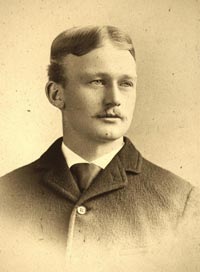Ernest Amory Codman
American surgeon and pioneer in hospital reform
Ernest Amory Codman (December 30, 1869 – November 23, 1940) was an American surgeon and a pioneer in hospital reform. He is best known for his development of the End Result System, a method to track the outcomes of patients to improve the quality of care.
Early life and education[edit | edit source]
Codman was born in Boston, Massachusetts, into a prominent family. He attended Harvard College, where he graduated in 1891, and then Harvard Medical School, earning his medical degree in 1895. During his time at Harvard, Codman developed an interest in surgery and medical education.
Career[edit | edit source]
After completing his education, Codman worked at the Massachusetts General Hospital and later became a faculty member at Harvard Medical School. He was a strong advocate for medical audits and believed that hospitals should be held accountable for the outcomes of their patients.
End Result System[edit | edit source]
Codman's most significant contribution to medicine was the development of the End Result System. This system involved tracking every patient treated in a hospital to determine the outcomes of their care. Codman believed that by analyzing these outcomes, hospitals could identify areas for improvement and enhance the quality of care provided to patients.
Hospital reform[edit | edit source]
Codman's ideas were initially met with resistance from the medical community. However, his work laid the foundation for modern quality assurance and patient safety initiatives in healthcare. He was a founding member of the American College of Surgeons and played a crucial role in the establishment of the Hospital Standardization Program.
Legacy[edit | edit source]
Although Codman's ideas were not widely accepted during his lifetime, they have since become fundamental principles in the field of healthcare quality improvement. Today, he is recognized as a pioneer in the field, and his work continues to influence modern medical practices.
Personal life[edit | edit source]
Codman married Katherine Putnam Bowditch in 1900, and they had three children. He spent his later years in Ponkapoag, Massachusetts, where he continued to advocate for hospital reform until his death in 1940.
See also[edit | edit source]
References[edit | edit source]
External links[edit | edit source]
Search WikiMD
Ad.Tired of being Overweight? Try W8MD's NYC physician weight loss.
Semaglutide (Ozempic / Wegovy and Tirzepatide (Mounjaro / Zepbound) available. Call 718 946 5500.
Advertise on WikiMD
|
WikiMD's Wellness Encyclopedia |
| Let Food Be Thy Medicine Medicine Thy Food - Hippocrates |
Translate this page: - East Asian
中文,
日本,
한국어,
South Asian
हिन्दी,
தமிழ்,
తెలుగు,
Urdu,
ಕನ್ನಡ,
Southeast Asian
Indonesian,
Vietnamese,
Thai,
မြန်မာဘာသာ,
বাংলা
European
español,
Deutsch,
français,
Greek,
português do Brasil,
polski,
română,
русский,
Nederlands,
norsk,
svenska,
suomi,
Italian
Middle Eastern & African
عربى,
Turkish,
Persian,
Hebrew,
Afrikaans,
isiZulu,
Kiswahili,
Other
Bulgarian,
Hungarian,
Czech,
Swedish,
മലയാളം,
मराठी,
ਪੰਜਾਬੀ,
ગુજરાતી,
Portuguese,
Ukrainian
Medical Disclaimer: WikiMD is not a substitute for professional medical advice. The information on WikiMD is provided as an information resource only, may be incorrect, outdated or misleading, and is not to be used or relied on for any diagnostic or treatment purposes. Please consult your health care provider before making any healthcare decisions or for guidance about a specific medical condition. WikiMD expressly disclaims responsibility, and shall have no liability, for any damages, loss, injury, or liability whatsoever suffered as a result of your reliance on the information contained in this site. By visiting this site you agree to the foregoing terms and conditions, which may from time to time be changed or supplemented by WikiMD. If you do not agree to the foregoing terms and conditions, you should not enter or use this site. See full disclaimer.
Credits:Most images are courtesy of Wikimedia commons, and templates, categories Wikipedia, licensed under CC BY SA or similar.
Contributors: Prab R. Tumpati, MD

